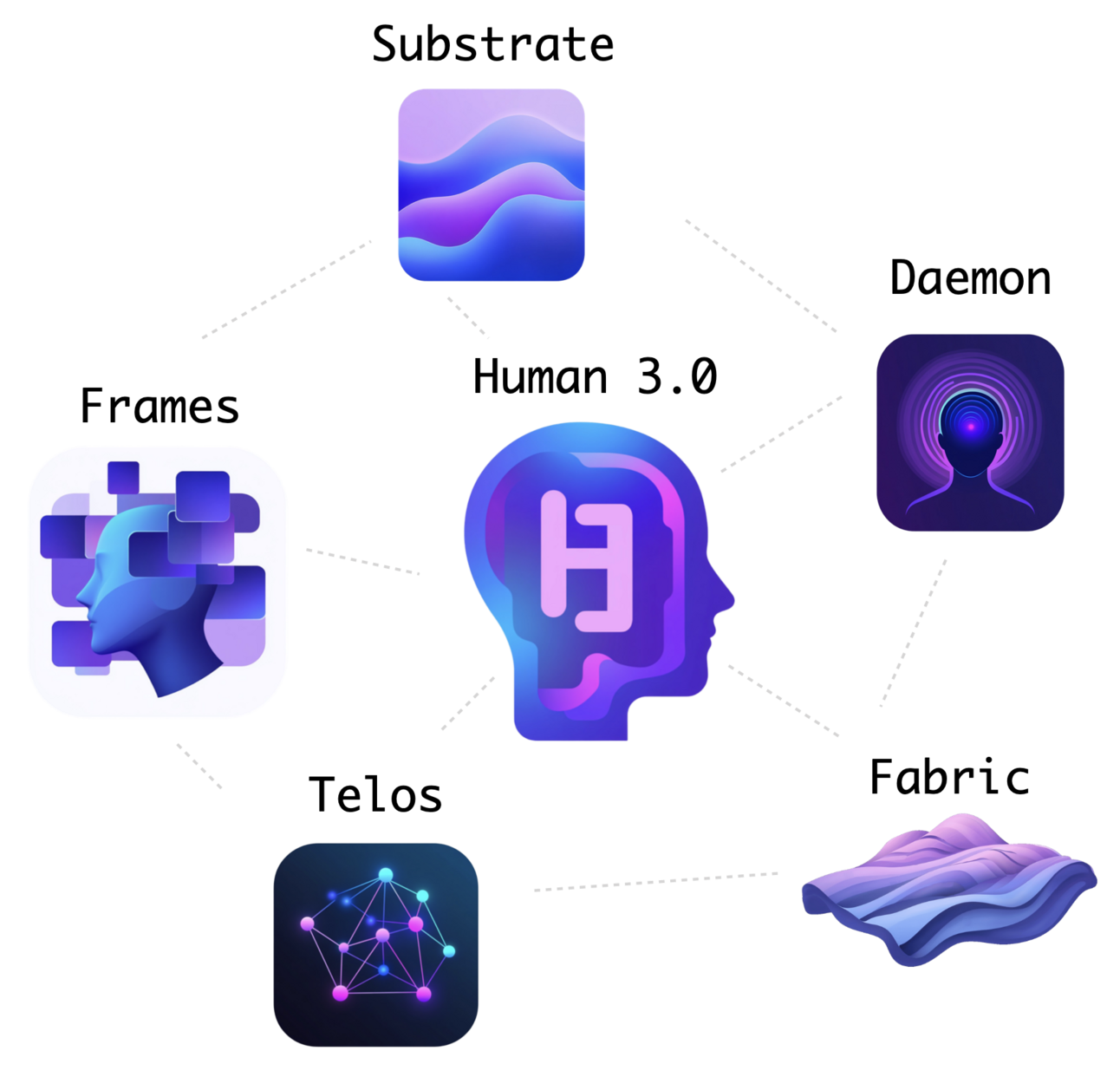How My Projects Fit Together

When people look at the various projects I've put out over the last year, they often ask which is the main one, or if they're all related. And if so—how?
So I see you doing Fabric, and then Substrate, and now you're on about some thing called Human 3.0. And what's this Telos thing?
Like, what are you actually doing? Is it all related?
Yes, they are related, and this is the page where I describe how.
The Problem(s)
I like starting every conversation about solutions with a clear description of the Problems they're meant to solve.
Here are the Problems that all my life's work—including all the projects above—is based around (WP = World Problem):
WP1: Humans are suffering from a lack of purpose and meaning in their lives, which is causing mental health and societal problems.
WP2: Humans do not understand—and are not prepared for—the sophistication and speed of introduction of AI into our society, which will cause major work disruptions and exacerbate our lack of purpose.
WP3: Humans are not trained to become full-spectrum people, but rather to become economically useful to a materialistic and transactional economy.
Most of my future work will be centered around solving these issues.
Security forever
There are two exceptions, however, that are purely in my home space of Information Security, which I still absolutely love and will never really move away from. I see AI as containing security, so I will continue doing security projects, assessments, consulting, advising, and thinking. It'll just likely be accompanied by a regular question of "How can I turn this into a (AI-enhanced) platform?".
Here are the two main security projects I'm currently working on and will continue (along with 1-2 security assessments per year).
- HELIOS—An AI-assisted continuous monitoring and assessment system for attack surfaces.
- DOMAIN—An AI-powered Security Program management framework and platform.
Basically, I will always be doing Information Security. It's in my DNA and has been since I was 17 years old when I first started playing with computers, and then in my security career starting in 1999. So I'll be doing security for at least 2-3 more decades—I just plan on also doing Human 3.0 stuff as well.
Now, let's look at how the projects relate to each other.
The projects
Let me start with each individual project and then show the relationships between them.
Substrate
Substrate is a new philosophy / design document for human organization and optimization. Think of it as an alternative operating system for humanity, or as a plan for what civilization(s) might look like for upgraded humans (H2, H3, H4, etc.).
Fabric
Fabric is an AI utility that applies Patterns to any input, and produces an output. A Pattern is a human-written set of instructions that tells AI what to do with the incoming data.
Fabric's philosophy is that AI's are far better than humans at most mental tasks, but humans still understand the desired shape of outputs far better than AIs. So we use the human-written Patterns to instruct the AI on what to do, and we get extraordinary outcomes.
TELOS
TELOS is my personal life philosophy. It's based on the concept of a life Mission—which is the thing you're trying to accomplish in life—and then using that to derive and inform Goals, Strategy, and Tactics. It's centered around Aristotle's concept of Eudaimonia—or Human Flourishing.
Daemon
Daemon is a system for human behavior change. I'll be talking more about this soon.
Human 3.0
Human 3.0 is a vision for what's next for humanity. Human 1.0 was early humans. Human 2.0 is us currently. And Human 3.0 is humans who are AI-augmented.
The vision looks at how humans might change as a result of AI, and what options we have for thriving in that new landscape.
How they all fit together
Now let me show you how they all connect.
More specifically:
Substrate is the new philosophy and design document for human organization and optimization. It's the foundation.
Fabric helps people take full advantage of AI to become their best selves and have their maximum positive impact on the world.
TELOS is a life framework for determining what you should be doing with your life so that you can Flourish as a human.
Daemon is a system for human behavior change that helps you actually implement the changes you want to make.
Human 3.0 is the umbrella project/narrative that explains what comes next for humanity as AI continues to develop, and how projects like Substrate, Fabric, TELOS, and Daemon help us navigate that transition.
Summary
My work centers around helping humans find meaning, purpose, and flourishing in an AI-dominated future.
The projects work together as a complete system:
- Substrate provides the philosophical foundation
- TELOS helps you find your life mission
- Fabric augments your capabilities with AI
- Daemon helps you change behaviors to achieve your goals
- Human 3.0 is the overarching vision that ties it all together
Each project can stand alone, but they're designed to work together as a complete system for human enhancement and flourishing in the age of AI.